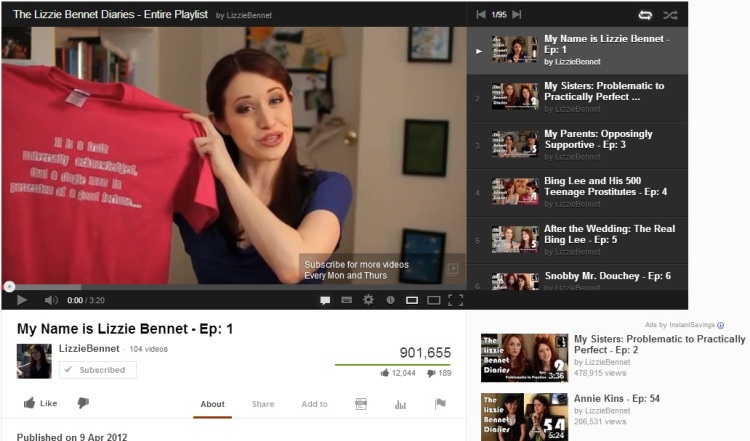I have recently come across ‘The Lizzie Bennet Diaries’ a very successful video blog taking the viewer through Austen’s classical novel, Pride and Prejudice. I’ve heard a lot of people say how great it is but I didn’t really check it out until I saw one of my favourite authors, Julia Quinn, keep posting about how she couldn’t stop watching them.
So I gave it a go, and I have to say for a modern adaptation it’s not bad. I’m coming to it very late – it started roughly a year ago. I’m only on episode three so very behind the times with it.
There are 95 short episodes – each under 5 minutes. It has a huge following and pages on all necessary social media: Facebook, Twitter and Tumblr. Just the amount of likes on the YouTube videos are a good indicator of it’s popularity.
Hank Green started the idea to vlog the famous book and created the project with Bernie Su. While the story is mainly told through the YouTube videos, it is also supported by vlogs from other characters and interaction through the different social media. It is scripted and the actors are professionally trained, volunteering their time to bring this classic novel to a new generation who may not even think to pick up the book.
Now, I am a massive fan of the book and I have seen other adaptations and there are plenty set in the modern era as well as reiterations of the period drama. One of the recent attempts was ITV’s Lost in Austen where we see Amanda Price go through a portal in her bathroom and enter the Austen world causing all sorts of issues with her modern ways – handing out lip gloss, singing ‘Downtown’ and being caught smoking a cigarette. The mini-series received critical praise but struggled in the ratings. When I watched it a few years later I found it to be very light-hearted and a good effort, but not something that will always be viewed. A good adaptation for anyone to watch if they’re reading the book for school but it really shouldn’t be taken seriously.
The Lizzie Bennet Diaries is another light-hearted adaptation. From the formal language in the novel to the contemporary language we use today, it’s a bit odd in how it somehow works so well.
When you get quotes like this, it’s not hard to see why.
The Lizzie Bennet Diaries are a lighthearted, frivolous and thoroughly enjoyable adaptation of the novel and now i’m off to watch more.


